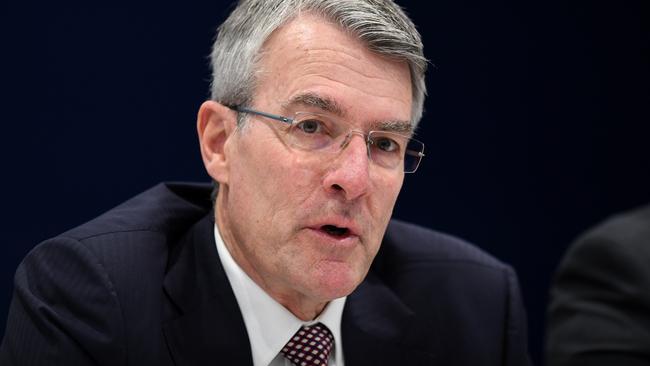More federal MPs under foreign citizenship cloud
A citizenship audit shows a rump of Labor MPs likely sat in parliament in breach of section 44.

An audit of citizenship records has revealed a rump of Labor MPs likely sat in parliament in breach of section 44 of the Constitution, dismantling former leader Bill Shorten’s claim the ALP had “strict vetting processes” and there was “no cloud over any of our people”.
In addition to the five Labor MPs who fought the Super Saturday by-elections or resigned from parliament in the midst of the dual citizenship crisis that ensnared the 45th parliament, four additional MPs appear to have contested previous elections while holding foreign citizenship. More than 20 parliamentarians — including senior Coalition and Labor MPs — have also refused to provide documentary evidence in the new citizenship register showing they are not in conflict with section 44, which prohibits dual citizens from sitting in parliament. Many MPs simply list their parents, grandparents and spouses’ citizenships with no further explanation.
The Australian understands both major parties are unlikely to pursue fresh High Court referrals of members and senators, with rules pushed through in the final two days of the last parliament to avoid escalating cases.
Mobile users view pdf here
Described by independent MP Andrew Wilkie as “grubby”, the procedure means a person’s election can only be referred to the Court of Disputed Returns if new evidence emerges about a person’s eligibility that is not disclosed on their register. The matter must first be investigated by a parliamentary committee.
The parliamentary qualifications register shows both major parties worked to revoke foreign allegiances for first-time MPs in the lead up to the May 18 election, with Katie Allen, Gladys Liu, Dave Sharma and Phillip Thompson from the Coalition and Josh Burns, Daniel Mulino and Anika Wells from the ALP among those who renounced dual citizenships.
Anthony Albanese and Labor frontbenchers Michelle Rowland and Mark Dreyfus list complicated family histories but no documentary proof of their claims they are not eligible to hold dual citizenship, as does Treasurer Josh Frydenberg and Liberal MP Julian Leeser.
Labor MP Ed Husic details his parents’ and grandparents’ birthplaces and former citizenships and says under Bosnia and Herzegovina law a child may acquire citizenship but needs to be registered by the age of 23 and neither he nor his parents pursued this option.
While most MPs without documentation assert they are not dual citizens, they have failed to include evidence from the relevant embassy or foreign authorities confirming they are not or have never been nationals of that country.
Mr Frydenberg is the only MP in this term of parliament so far facing a potential challenge to his eligibility, after Kooyong climate activist Michael Staindl lodged a High Court petition.
Of the four additional Labor MPs who may have been dual citizens in previous parliaments, Nick Champion and Pat Conroy applied to renounce their British citizenship before nominating for the election but did not have their renunciation registered until after polling day.
The High Court has ruled a candidate must not be a dual citizen when nominations for an election close, or are otherwise ineligible to sit in parliament.
“I only was preselected a week before the election was called so physically I couldn’t have gotten the form in any earlier,” Mr Conroy said. “Our legal advice (when he was first elected in 2013), which the High Court disagreed with, was that the act of renunciation was signing and submitting the form.”
Scott Morrison and Angus Taylor listed maternal grandparents born in New Zealand but, similar to UK law, citizenship by descent cannot be handed down from grandparents to grandchildren.
According to register documents, 23 sitting senators have renounced or lost foreign citizenship to take their places in parliament.
Perth barrister John Cameron, who sparked the 2017 citizenship crisis by exposing former Greens senator Scott Ludlam’s dual citizenship, said politicians “knew they were vulnerable” and he wasn’t “surprised about a sweetheart deal” to neutralise the section 44 stand-off.
Mr Cameron, who conceded it was clearly difficult for some MPs to prove their citizenship status, said for others the documents were easy enough to produce. However, he said it remained an issue that those who had been disqualified had not suffered any penalty, were not forced to repay taxpayer money and that some would receive parliamentary pensions.
Members of the public have a 40-day period from the return of the writs to lodge a petition in the High Court to challenge an MP’s eligibility. After that window, which has already closed for the 46th parliament, only the House and Senate can refer an MP using the new procedure.
University of NSW constitutional lawyer George Williams said the parliament had attempted to “artificially create stability” by making it harder to refer an MP. “The problem is it may not be apparent there is a problem (with someone’s eligibility) until after that 40-day period. It can take a very long time to work through citizenship issues,” Professor Williams said.
“What will bring this to a head is if someone is identified as having disclosed something and it becomes apparent after this (40-day) period they shouldn’t be there — in that case it’s hard to see how these rules could be maintained.
‘‘That would create a major problem of public confidence.”



To join the conversation, please log in. Don't have an account? Register
Join the conversation, you are commenting as Logout